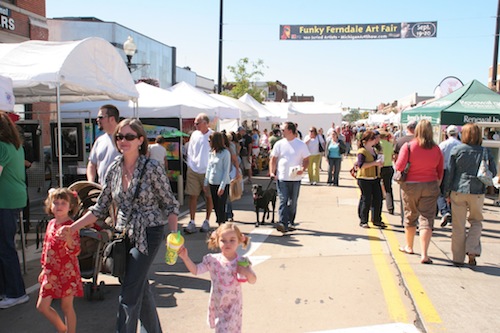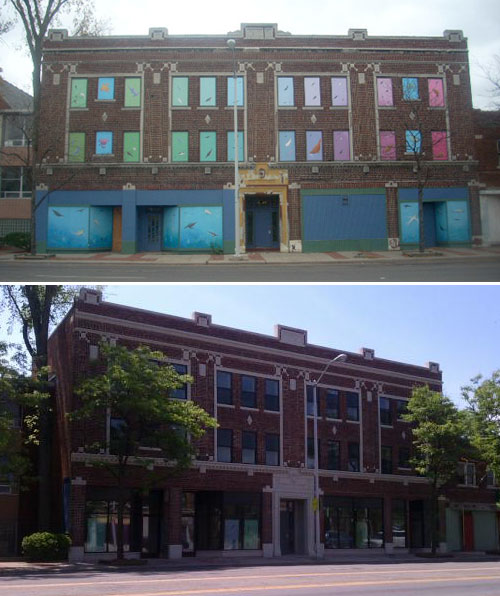This is part of a series of posts highlighting the art fair and festival industry. Know someone we should talk to? Email your suggestions!
Creative Conversations: An interview with event producer Mark Loeb
Mark Loeb is the president of Integrity Shows, an event production company in Michigan. Mark has been producing events since 1982 and, at one point, was producing over 200 events annually. Mark has been with Integrity shows since 1996 (the company was founded in 1997) making goal-centered events with a specific purpose and target audiences.
Recently, ZAPP intern Anna Charney approached Mark to ask him about being an event producer of several art festivals in the Michigan area.
ZAPP: How long have you been in event production? What made you choose that as your career?
Loeb: While I [initially] never realized that the event business was a possibility, I now see that it was inevitable. I started my own children’s theater company when I was 18. I then went into commercial events and helped my brother grow his company until we were producing over 200 projects annually in 48 states. About fifteen years ago I re-focused in my passion for arts and started working for festivals in the Detroit area. I was unable to exercise my creativity completely so I have been starting some of my events in addition to those that I contract with.
ZAPP: Can you explain a little about Integrity Shows?
Loeb: My biggest pet peeve about events is that there are producers out there giving incorrect information either intentionally or through ignorance. Attendance numbers, for example, seem to be randomly created to attract sponsors and vendors. Sadly, this works. I prefer to focus on projects that help towns, businesses and artists to reach their goals. As such, I have this unfortunate tendency to be upfront and direct. As a result, I may not make as much money, though I think it allows me to make a bigger impact. Why the name Integrity Shows? It helps me to focus on this difference. My passion is in the arts so it makes sense to focus on those events. I find also that different folks speak different “languages”. I can speak with artists well.

An image from the Funky Ferndale Art Fair – a fair specifically designed to attract young and upwardly mobile professionals.
ZAPP: Many or most of your shows are art fairs and festivals, what made you decide to go more in this direction as to the shows you produce?
Loeb: I like events where the attendees, the participants and the hosts are all happy at the end. My goal is to have each event be very focused to the community and the participants. No “everything for everyone” events. Shows like the Royal Oak Clay, Glass and Metal Show and the Funky Ferndale Art Fair make it very clear what to expect so that participants can self-select. The result is that our audiences are appropriate for the artwork and for the communities.
How many different art shows do you produce and how long have you been producing them for?
Loeb: I try to start a few new projects every year. Some I just consult with. Some I start and then turn over. A few I have been involved with for over fifteen years. I hope to do more and more consulting in the future as I think that my approach is unusual and one that can greatly benefit organizations and communities.
ZAPP: Integrity Shows pride themselves on being “goal centered events,” how do you identify a goal and embrace it? What is a great success that you have seen in one of your art shows?
Loeb: My events start with a purpose and end with a result. Let me give you an example. Ten years ago we started Jazzin on Jefferson in Detroit with the goal of celebrating a rich musical heritage of a struggling neighborhood with great assets. The first year’s success was having ten thousand people dancing in the street. The next few years we started focusing on neighborhood tours and available buildings. Kathy Makino [a Michigan developer] was at one of the events and fell in love with two of our unused structures. She bought them and renovated. This year we have five stores in those buildings for the month, 42 apartments above them and are focusing on the upward movement of the neighborhood. Did the event create the momentum? Probably not, but it certainly sped it up.

The before and after pictures of the building renovated by Kathy Makino.
ZAPP: What changes have you seen in the festival business during your time working in it? What do you see for the future of the business?
Loeb: My challenge right now is trying to figure out how to create art festivals that appeal to young and old. There is quite a bit of crossover in visual style between the different age groups, but the settings that interest them may be quite different. In Ferndale we have created a quieter funky festival on the retail end of town which appeals to a slightly older audience. Across the road is the DIY show which attracts a younger audience. By having hem adjacent most folks visit both sides. One of the basics is a soundtrack. Those under thirty grew up with a soundtrack to every aspect of their lives- video games and such. They want music wherever they go. Older folk tend to want to focus on one sense at a time, so music is a distraction for them. This applies both to the artists and to the customers. Curating an experience that appeals to both is a challenge, and one that I will play with for quite some time.
–By Anna Charney
Anna Charney studies studio painting and drawing at The School of The Art Institute of Chicago. She is a Denver native and decided to spend her 2013 summer back at home hanging around the ZAPP offices as an intern to learn about the arts festival business. While they share a last name and an excellent fashion sense, she is not related to ZAPP’s managing director, Leah Charney. You can see her artist’s gallery at www.annacharneyart.com.
